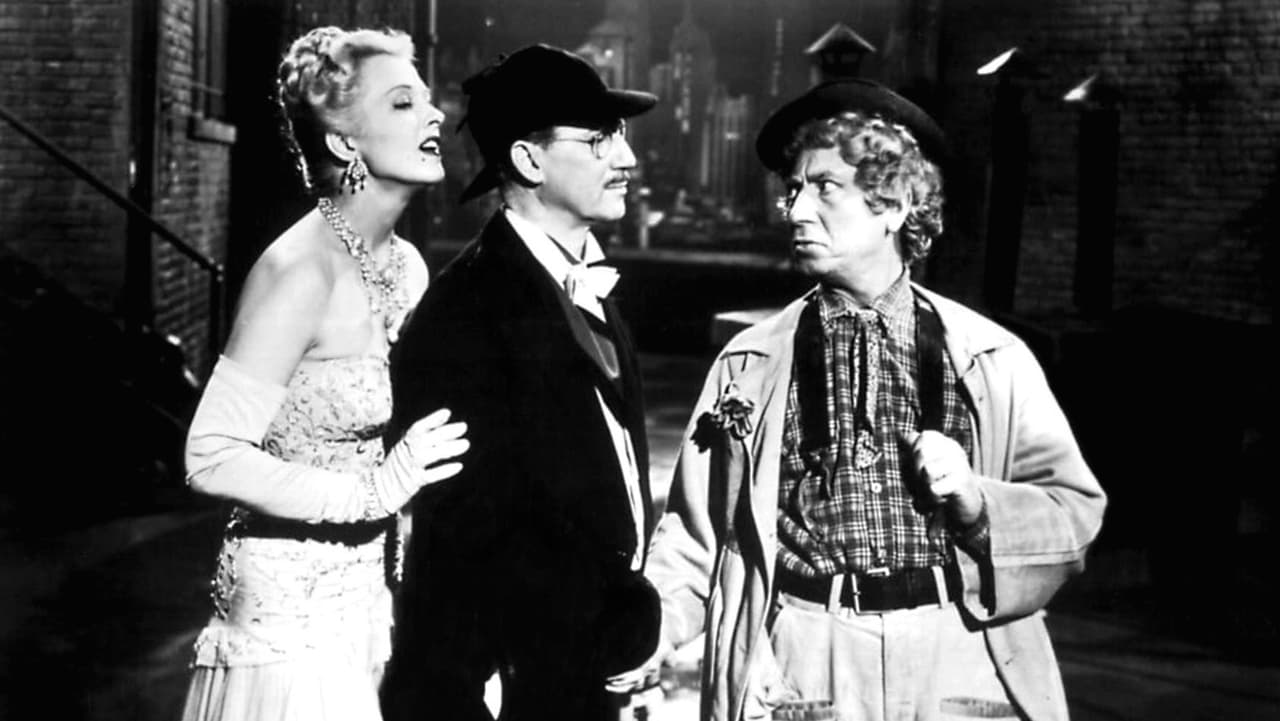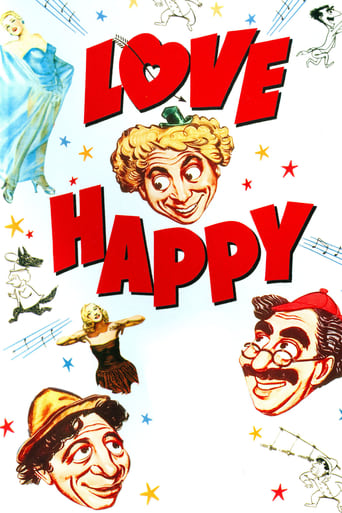



This is a small, humorous movie in some ways, but it has a huge heart. What a nice experience.
View MoreOne of the worst ways to make a cult movie is to set out to make a cult movie.
View MoreThe storyline feels a little thin and moth-eaten in parts but this sequel is plenty of fun.
View MoreIt's simply great fun, a winsome film and an occasionally over-the-top luxury fantasy that never flags.
View MoreI disagree with the put downs of this film by some viewers, for a very simple reason: I enjoyed watching it and found it funny. Sure, the plot is a little weak, but who watches Marx Brothers films for the plot? Actually, the plot is stronger than in many of their movies. Groucho's role is certainly weak, but this may be Harpo's finest film, which showcases his beautiful comic style. Chico does fine, too. And they both deliver some wonderful musical performances. The scene near the end on the rooftop amid the Times Square advertising signs is delightful. There seems to be an obvious element of "product placement," though I don't know whether the filmmakers got paid for this, but that all adds to the peculiar humor of the scene. It's been a very long time since I first saw the classic Marx Brothers films, at least as an adult who could appreciate them. Back then they were funny. But I can't say they crack me up these days, as the gags have gotten old. So it was wonderful to find this Marx Brothers film I hadn't seen, and to laugh at them again. This is a funny film. Period.It is a bit sad knowing this was their last film, also knowing the great young comedy writers who were about to get started in live television, including Mel Brooks and Woody Allen. If only their talent could have been turned to writing more scripts for the Marx Brothers. Instead, they wrote for Sid Caesar's television shows, which in some ways were the heirs to the Marx Brothers humor. I think I will watch Love Happy again, soon. I want to watch Harpo's performance more closely. It seems to me he was the last of the silent film comedians, in the tradition of Chaplin and Buster Keaton, whose humor was all in their body language. And this was his last great work.
View MoreDespite the heavy advertising of Marilyn Monroe on the cover for any of the videos, she only has a small walk-on role. That's only one of many disappointments awaiting the person who rents this movie. The Marx Bros. were filmed separately - they have no scenes together - so there's no chance to capture that manic comic energy. Harpo plays the harp often, with the movie grinding to a halt every time this happens. Groucho literally phones his scenes in - he's in an office with a phone and nearly everything he does happens here. Meanwhile, nothing funny happens anywhere. A sad final note in what was otherwise a hilarious and illustrious career by one of the greatest comedy film teams ever.
View MoreLOVE HAPPY (United Artists, 1949), a Mary Pickford presentation, directed by David Miller, became the 13th and final collaboration of Marx Brothers comedy team, this time with a few alterations, especially in featuring the silent one, Harpo, as the leading character, with Chico and Groucho taking on lesser responsibilities. While this could have been simply a Harpo Marx comedy, following Groucho's solo effort in COPACABANA (1947), someone probably didn't think it possible to have Harpo carrying on 85 minutes of screen time without his brothers, in spite the fact that he's credited as author of the story. The final result is a musical-comedy labeled the least liked of all the Marx Brothers movies. Overlooking it's negative reputation, it be best to consider the possibilities of what the story has to offer, with some fine comedy material thrown in, that actually keeps this one from being a total disaster.The story opens in typical 1940s fashion, with Groucho as Detective Sam Grunion relating to the movie audience as to how he had spent eleven years investigating a million dollar theft of the Ramanoff diamonds, followed by his introduction of numerous characters, including Mike Johnson (Paul Valentine), both manager and leading man; Maggie Phillips (Vera-Ellen), his dancing partner; Bunny Dolan (Marion Hutton), a singer and Maggie's best friend; and finally Harpo (Harpo), a kindly hobo who happens to be love happy for Maggie. He helps the troupe by supplying them with stolen food. Also in the company is Faustino the Great (Chico Marx), a mind reader. Madame Egilichi (Ilona Massey), the leader of a gang responsible for the stolen jewels, is told by Throckmorton (Melville Cooper), who uses a delicatessen as a front, that the diamonds have been placed in a sardine can marked with a cross. It so happens that Harpo had taken this can, along with other canned goodies, for his hungry actor friends. Because the diamonds are somewhere in the theater, Egilichi finances the show, leading to a merry slapstick chase on the rooftop as Egilichi, and her henchmen, the Zoto Brothers (Bruce Gordon and Raymond Burr) go after Harpo and Faustino, who have both the real as well as the phony diamonds in their possessions, while Sam Grunion makes his reappearance before concluding his narrative to the great diamond caper. And watch for the surprise ending.LOVE HAPPY is actually not an attempt to revive the Marx Brothers on screen, for that their best work was already behind them, yet it shows how far they have come, twenty years from their screen debut (1929). Age has caught up with the brothers this time around. Considering the changing times, especially after World War II, their brand of comedy might be, by 1949 standards, old-fashioned, far-fetched or overly familiar. For the first time on screen, Groucho looks more natural, sporting a real mustache, instead of his traditional black tape over his lip. Chico continues to be in character, Italian accented, pointy hat, and once again translating Harpo's mimed message distress call following Maggie's abduction. Chico does provide moments of nostalgia by refusing a can of sardines in favor of his DAY AT THE RACES (1937) product of "Tutsi-Fruitsi ice cream." Aside from playing the piano, Chico offers few comedic moments, such as losing a game of cards to a dog(!). The Harpo here breaks away from his traditional characterization, being toned down a bit and being a range between the old Harpo to that of the sentimental likes of Charlie Chaplin. Key scenes find him falling victim to Egliouchi's thugs as they attempt to empty out his pockets for the diamonds, taking out everything imaginable, including a live dog! When all else fails, poor Harpo is put through the torture test such as smoking rope for six straight hours; spinning in a washing machine filled with water; tied to a revolving rack; being tempted by food at a distance while starving and tied to a chair; and finally the William Tell test. Even Egilichi's attempt to vamp him nearly works, but Harpo uttering a word is totally impossible.On the musical program, there's "Love Happy" (sung during opening credits); "Mama Wants to Know," "Willow Weep for Me," "The Sadie Thompson Number," "Gypsy Love Song" (piano solo by Chico) by Franz Lehar; "Happy Birthday to You," "Swanee River" by Stephen Foster (Harpo on the harp) and "Love Happy" (reprise, closing credits).Paul Valentine, Raymond Burr and Marilyn Monroe receive special introductory billing during the opening credits. Although still new to the business, this is not their movie debuts, yet the starring status of Burr and Monroe, would only be a few years into their futures. Monroe's very brief scene with Groucho as a lady in distress constantly being followed by men is truly a highlight.So ends the movie careers of Groucho, Harpo and Chico as a team. With this being their last, it was one of the first to be distributed onto video cassette during the early 1980s, notably with the video storage case featuring Marilyn Monroe and Groucho Marx on the cover, and currently available on DVD (with restored footage). For its cable TV broadcast history, it alternated between American Movie Classics (1995-2000) and Turner Classic Movies. In spite of an odd mixture of gags, ranging from good, bad to disturbing, LOVE HAPPY has enough ingredients to satisfy any Marx Brothers fans. (**1/2)
View MoreBecause I like the Marx Brothers I am willing to give this film a 5. If it had starred Wheeler and Woolsey or the Ritz Brothers, I might have given it a 2.After ROOM SERVICE, only A NIGHT IN CASABLANCA had any real merit among the final Marx Brother films. In the case of these two films, the former was based on a successful Broadway farce (which is still produced occasionally), and the latter had some planning involved in it as well (a novelization of the complete screenplay - certain parts were edited out of the final film - was published). The other four are mediocre at best. And LOVE HAPPY is the weakest.Yeah, Harpo gets some nice moments, like him riding the neon lit "Pegasus" on a rooftop sign. He and Chico have one or two good sequences together (one of those patented "Chico-verbally-interpreting-Harpo's-mimed-message" sequences is good). Chico also has a wonderful moment when he tries to be romantic to Ilona Massey, promising to cover her in sardines. But these are so few and far between that the weaknesses in the film are shown.Yeah, Groucho is an afterthought. He has that one famous moment with Marilyn Monroe, but that's it. It looks like much of Groucho's material ended up on a cutting room floor. His "Watson" figure is Eric Blore (an interesting combination of comic talents there), but Blore too is only briefly seen. One wishes to know what more there was to that sequence.But even if we discount shortchanging Groucho, what is left is nothing to shout about. It is a disappointing film, especially as it was the last real Marx Brother feature film. The following movie the brothers were all in was THE STORY OF MANKIND, and each was in a separate segment. There were three television shows they were in together (though one was with other Hollywood comics like Ernie Kovacs), but none of these had the strengths of their best nine movies.
View More